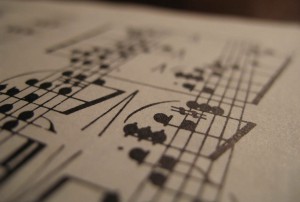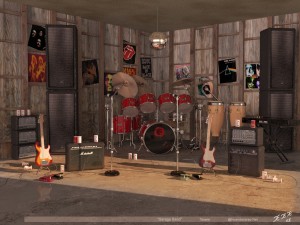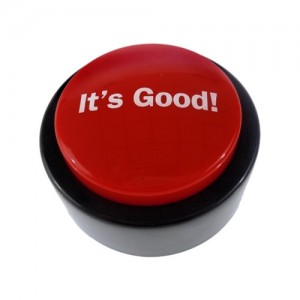So…you’re wondering if you should learn music theory?
 Dominant 7th Sharp 5, modes of the harmonic minor scale, tritone substitutions…Blergh!!!
Dominant 7th Sharp 5, modes of the harmonic minor scale, tritone substitutions…Blergh!!!
I’m just kidding, but music theory is a sore subject for a lot of us. So many of us have such a bad relationship with the thought of having to learn music theory that we don’t think about and learning any of it.
It can seem like a daunting, insurmountable task.
Now I’m not going to sit here and tell you that everybody should learn everything about music theory.
But I’m not going to say that nobody should learn anything about it either.
It’s all a question of what you want to do…
 If you’re just getting together in your garage with a couple of friends every once in a while and playing some tunes, your need to learn music theory will be pretty low.
If you’re just getting together in your garage with a couple of friends every once in a while and playing some tunes, your need to learn music theory will be pretty low.
You may even be able to get by without knowing any of the names of the notes on your bass – and that’s great!!!
However, if you want to make a living as something more than an amateur musician, you should probably get to know the basics of music theory.
Not everything! I’m not saying you have to dedicate huge amounts of time and effort to it. If you put in just a little work, it will let you speak to other musicians in a ‘common tongue’ which will make things a lot easier.
I’ve witnessed some unbelievably frustrating conversations taking place between musicians who knew the music theory language and others that didn’t.
Thankfully, I’m well versed in both languages so most of the time, I was able to translate. (I didn’t learn any music theory until I had been playing for years)
Having a small knowledge of theory will also make songwriting a lot more satisfying. The more knowledge you have, the options you are giving yourself when it comes to creating music – songs and basslines.
But let’s assume that you’re going to take the plunge and have a crack at learning some of this theory stuff…
Three Important Things To Remember When Starting To Learn Music Theory
#1 – It’s music theory, not music fact!
Nothing is absolute. There are contradictions all over the world of music theory so if you find something that seems to contradict itself, don’t worry. There will almost certainly be a way to explain it, but don’t get too concerned about it.
Just accept it and move on – you can always come back to it later…
#2 – Theory has always followed music – THE MUSIC CAME FIRST!!!

Music theorists didn’t have a big meeting in a secret room and make decisions about how music should sound.
Musicians were always at the forefront. Musicians played new sounds that they liked and then the theorists came through afterwards to try and explain what they were hearing.
It all started with the music. There are exceptions to this rule, but in general, the music came first.
This leads to point number three…
#3 – If it sounds good, it is good

If something you’re playing can’t be explained by the theory that you know right now, either (1) You’ve stumbled upon a completely new sound nobody has ever played ever before or (2) You just don’t know the piece of theory that can explain what you’re playing.
I’m guessing it would be the second one…
Wrapping Up…
Is music theory essential for everyone? No!
Can it be beneficial? Yes!
Put it this way: It won’t hurt you to know a little theory, but you could be at a disadvantage if you don’t know any.
I want to hear about your experience with music theory. Has it helped you? Hindered you? Do you know lots or none?
If you have any questions about anything music theory related, leave a comment below. You can also contact me directly and I’ll help you out as best I can.
With gratitude,
[twitter style=”horizontal” float=”left”] [fblike style=”standard” showfaces=”false” width=”450″ verb=”like” font=”arial”] [fbshare type=”button”]



Hi, first congrat for your website.
Your ticket about music theory is a very good one I think. I have been playing bass for 5 years now, with some pauses unfortunately.
I now have a band, just recorded an EP and so my motivation is getting higher every day. Until now I always wanted to learn some theory but didn’t really feel the need as you write in your article. But now that “shit is getitng real” with my band and I really want to improve my playing and it appears to me that learning some basic theory such as scales, chords, intervals, the why and the how is gonna be a huge plus for my futur composition.
If you just want to play songs of your favorite bands you don’t need music theory but if you want to create music you’ll quickly need it, unless of course you are the new music genius of the century :p
by.
ps: Sorry for my writing, I’m French
Hey Pierre!
Congratulations on your band’s EP. That’s awesome! And you’re totally right – now that you have the motivation to start digging into some theory, not only is it going to be fun for you (rather than dull and boring), but like you said – you can start adding to your compositions! Knowing a bit of theory can really open up possibilities and you can start using new sounds that you may never have thought of before!
All the best to you and your band – and your English writing is fine! (Much better than my French!)
Cheers,
Luke
Nearly all of what gets called music theory is not a theory of anything; it’s just terminology – knowing the words to communicate with other musicians. Understanding phrases like “it doesn’t go back to the tonic; it stays on the dominant”, or “it doesn’t want to sound like 12/8, it should be a swung 4/4”, knowing these things doesn’t diminish your spontaneity or prevent you choosing what notes you play. It just means you can talk to your band mates about the music. Good luck with your efforts, Luke.
You’re exactly right Geoff! It’s a way to communicate with others – providing they speak the same language! I know I’ve had to act as a translator in a lot of bands where some knew the language and others didn’t. It’s always entertaining! 🙂
Thanks so much for your insight!
i started playing guitar about twenty years ago,i bought a second hand classical and it came with some paper back books with the usual nursery rhyme stuff to play and how this related to music notation ,etc,etc.
no theory of intervals,how to construct chords,like flat 5’s,added13’s,7 this ,9 that.
i was as alot of people are and many lesson sites are teaching of,and this is being or how to be a human juke box,dont get me wrong i played for my own pleasure for twenty years just knowing shapes of open and barre chords,some classical stuff,arpeggios,and general playing skills in the phyisical form,no theory,i had no idea of keys,scales,intervals ,chord progressions like 1,4,5 or 2,5,1 styles.
recently ,and i mean the start of 2015 ,i have had my eyes oppened by learning some theory,what a massive boost to my playing skills and ideas,for soloing,most of this has been for guitar,but the bass is no different,to be able to play a improvised solo to a backing track of a favorite tune because i know the key it’s played in and play using a scale in that key is a lesson in it’s self that shows a little theory can carry you a long way in youre own playing.
i just wish i had had the internet and knowledge of site such as this when i first picked up a guitar let alone the bass.
as for the bass this site has given me all the chord shapes and ideas to create my own bass lines to play over with my looper.
exellent stuff.
Hey John,
Thanks for sharing your story. It’s great to hear that you got so much out of learning a little theory. It can be very helpful when you’re doing things like creating your own bass lines and songs.
I’m glad you’re finding everything on the site useful – that’s great news. Thanks again for sharing your story. I really appreciate it.
Cheers,
Luke
Great attitude. Thank you for the moderate but realistic approach. I’ve been playing 30 years without knowing music…and I’ve lost a few auditions because of it. My fault.
Hey Christopher – I’m glad you like the approach. And the good news is that it’s never too late to learn how everything in music fits together. If you’re interested in any of that stuff, feel free to drop me an email. I’d be more than happy to help you out however I can – Luke